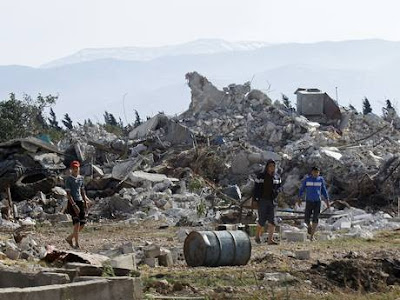 |
| "Syrian youths walk amongst the rubble in the village of al-Hamidiyeh, north of Qusayr, in Homs province." |
By Patrick Cockburn
The Independent, June 28, 2013
"Khalid is too frightened of travelling the 100 miles from Homs to Damascus to ask officials if they know what happened to his three sons, who disappeared 16 months ago as government troops over-ran the rebel stronghold of Baba Amr. He has not heard anything from them since and does not know if they are alive or dead, though he has repeatedly asked the authorities in Homs, Syria's third-largest city, about them. Khalid, a thick-set man of 60 with grizzled white hair -- who used to be a construction worker until he injured his back -- says he dare not make the journey to Damascus because 'as soon as the soldiers at the checkpoints on the road see I come from a place like Baba Amr, with a reputation for supporting the rebels, they are likely to arrest me'. He explains that he cannot risk being detained because he has a wife and four daughters who rely on him. He is the last man left in his family since his sons went missing. Syria is full of parents trying to keep their children alive or simply seeking to find out if they are already dead. It is as if both sides in the civil war are in a competition to see who can commit the worst atrocities. A few days before I spoke to Khalid I saw a picture on the internet of a fresh-faced 23-year-old soldier called Youssef Kais Abdin from near the port city of Latakia. He had been kidnapped a week earlier by the al Qa'ida-affiliated Jabhat al-Nusra while serving in the north-east of Syria, close to the Iraqi border. The next his parents heard of Youssef was a call from their son’s mobile at 4am from al-Nusra telling them to look for a picture of their son online. When they did so, they saw his decapitated body in a pool of blood with his severed head placed on top of it. The Syrian conflict is a civil war with all the horrors traditionally inflicted in such struggles wherever they are fought, be it Syria today or Russia, Spain, Greece, Lebanon or Iraq in the past. For the newly appointed American National Security Adviser Susan Rice, David Cameron or William Hague to pretend that this is a simple battle between a dictatorial government and an oppressed people is to misrepresent or misunderstand what is happening on the ground.
